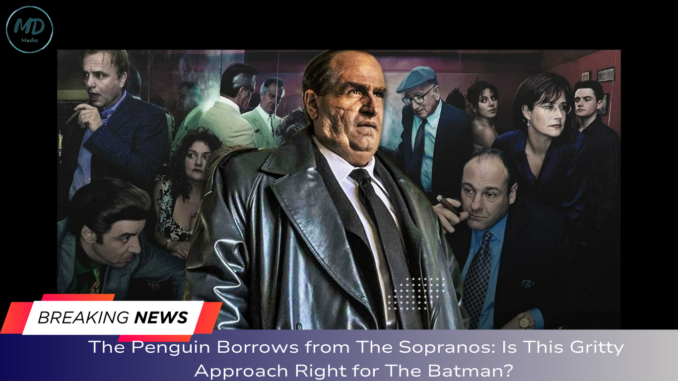
Colin Farrell’s portrayal of the Penguin in The Batman left quite the impression, and now, with the upcoming series The Penguin, fans are buzzing about what’s next for this iconic character. But how does this new show compare to the beloved crime dramas of the past, particularly The Sopranos? Let’s dive into what makes The Penguin a fresh, gritty take on Gotham’s underbelly and whether it’s the right fit for the Batman universe.
A Gritty Crime Drama: Setting the Tone
The Penguin’s Dark World
The Penguin is not your typical superhero show. In fact, it distances itself from the superhero genre altogether, embracing a more adult and grounded narrative. Following the events of The Batman, this series focuses on Oswald Cobblepot’s (a.k.a. the Penguin) rise in Gotham’s organized crime scene after the death of Carmine Falcone.
With no Batman in sight, the show dives deep into the gritty realities of crime and survival in a corrupt city. Instead of capes and superpowers, we’re treated to the raw, often brutal world of mob politics, making it feel more like The Sopranos than a traditional comic book adaptation. The series promises to be a noir tour de force, showcasing the human struggles and dark ambitions of its characters.
Character Development and Complexity
One of the standout features of The Penguin is its commitment to character development. The series captures the essence of its titular character, allowing viewers to witness his evolution from a low-level crook to a significant player in Gotham’s crime hierarchy. This transformation mirrors the arc of characters in The Sopranos, particularly Tony Soprano, whose journey through crime and moral ambiguity captivated audiences.
As Cobblepot navigates alliances with figures like Sofia Falcone and rival Sal Maroni, viewers will see a character struggling with loyalty, ambition, and the inherent darkness of his choices. It’s a relatable yet tragic tale that draws viewers into a world that feels both familiar and perilous.
The Sopranos Influence: A Familiar Format
Flashbacks and Storytelling
The Penguin utilizes a narrative style reminiscent of The Sopranos. The series employs flashbacks to deepen the storyline, exploring Cobblepot’s past and how it shaped his current motivations. This technique not only adds depth to the character but also enriches the storytelling, allowing viewers to understand the complexities of his relationships and the city he inhabits.
In The Sopranos, flashbacks often provided insight into Tony’s psyche and the influences that shaped him. Similarly, The Penguin aims to delve into Cobblepot’s formative years, highlighting the hopelessness and desperation that drive him to seek power in a ruthless environment.
The Bleak Atmosphere
The tone of The Penguin is decidedly bleak and morose, akin to the heavy atmosphere of The Sopranos. The show doesn’t shy away from violence or adult themes, which is reflected in its TV-MA rating. The darker elements serve to elevate the narrative, making it more than just a superhero spinoff; it becomes a serious examination of crime and its consequences.
While some fans may miss the colorful, fantastical elements often associated with comic book adaptations, this grounded approach is likely to resonate with audiences looking for more serious storytelling. It’s a refreshing departure that sets The Penguin apart from its more whimsical counterparts in the superhero genre.
The Future of Batman’s Universe: A Balancing Act
Two Universes, Two Tones
While The Penguin leans heavily into the gritty, noir style, there’s another side to the Batman franchise emerging. James Gunn is revamping the DC Universe (DCU) to include more classic takes on beloved characters, promising a brighter, more action-oriented tone. This could create an interesting dichotomy: a darker, more realistic Batman world alongside a more traditional superhero universe.
Fans eager for a wider array of Batman villains—like Mr. Freeze or Clayface—might find themselves at odds with the grounded approach of Matt Reeves’ films. However, the existence of both the ReevesVerse and the new DCU means that audiences can enjoy different interpretations of the characters they love.
The Risks of Changing the Tone
One concern with diverging too far from the grounded style of The Penguin is that it could dilute the narrative power of Reeves’ vision. Introducing outlandish characters or fantastical elements into the gritty world of The Penguin could disrupt the carefully crafted tone, similar to how bringing aliens into The Sopranos would feel jarring.
The success of The Penguin lies in its commitment to realism and character-driven storytelling. If it strays into comic book absurdity, it risks losing the emotional depth that makes it compelling.
Conclusion: The Right Move for the Batman Franchise?
The Penguin represents a significant step forward for the Batman franchise, embracing a darker, more nuanced approach to storytelling. By focusing on character development and gritty realism, it aligns itself more closely with crime dramas like The Sopranos than traditional superhero narratives.
This shift may alienate some fans who prefer the more whimsical aspects of comic book lore, but it also opens up a new avenue for storytelling that resonates with contemporary audiences. By keeping the tone grounded and exploring the human condition through the lens of Gotham’s criminal underbelly, The Penguin has the potential to carve out a unique space within the broader Batman universe.
